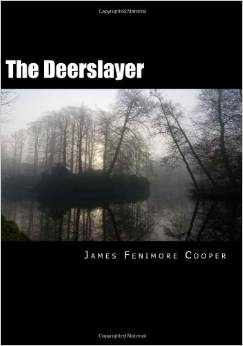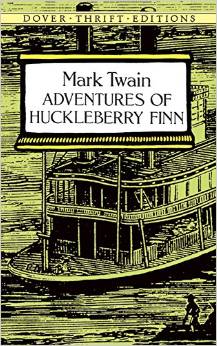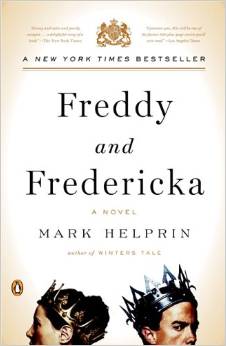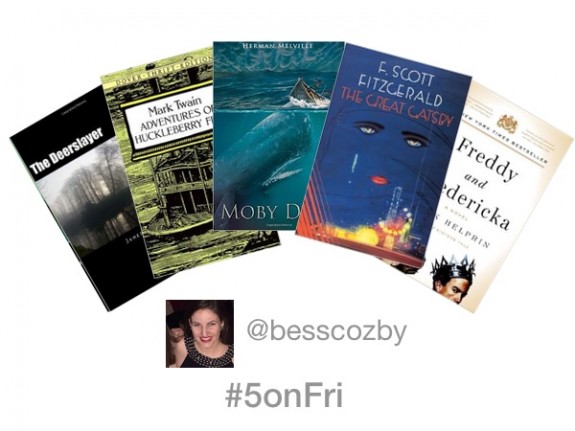Washington’s Birthday is coming up and, in honor of that, I want to talk about American novels. There’s been a lot of debate about what constitutes the “Great American Novel.” With so many voices, and so many different experiences in American life, this list should be huge. Since we only do five books on a Friday, I’m going to focus on books that focus on outsiders. It’s my personal opinion that any great American novel will feature this as a theme. It’s a common thread for most Americans: the struggle between the old world and the new, and the many worlds within American culture. I don’t think any of us really feel that we “fit in.” This has been a struggle for Americans since before the revolution. Perhaps it is a fundamental part of our identity.
Since there are so many great American novels that deal with this theme, I’m actually going to break this into two posts: this week, I’ll focus on such novels with male protagonists, and in a few weeks, I’ll do the same with female protagonists.
Five American Novels For the Outsider in all Of Us
 The Deerslayer
The Deerslayer
By: James Fenimoore Cooper
This is generally considered to be the first distinctly American novel, and Natty Bummpo—also known as Hawkeye—is an iconic American figure. Like many Americans, he is a child of two worlds, and struggles to find where he fits. He’s white, but was raised by Native Americans. This dual identity is a struggle for him throughout Deerslayer and Cooper’s other books, including, Last of the Mohicans.
He is the consummate outsider. Hawkeye never really resolves it. But like many Americans, Hawkeye approaches this with a stoicism that doesn’t ever give way to romanticism. There’s no waxing eloquent in this book. He remains a man of the wilderness, an expert hunter, and can’t ever blend into life with other settlers. He becomes wild, with an animal’s cruelty and gentleness, a constant contrast to the other settlers. In an essay about this character, D.H. Lawrence writes: “The essential American soul is hard, isolate, stoic and a killer. It has never yet melted.”
 The Adventures of Huckleberry Finn
The Adventures of Huckleberry Finn
By: Mark Twain
In the nineteenth century, most novels, including Twain’s own The Adventures of Tom Sawyer, employed a narrator so that, even when common characters were featured, there was a buffer between the gentle reader and these rougher types. Twain did away with that in The Adventures of Huckleberry Finn, and ended up writing a great American novel.
When he started the novel, it was supposed to be just another boy’s adventure story, like Tom Sawyer. But Mark Twain did two very different things in Huckleberry Finn: first, he gave the narration over to Huck, the destitute son of the town drunk. He then further complicated matters by having Huck take off with another outsider: the runaway slave, Jem. When the Huck and Jem’s little raft crashes into a ferry boat, Mark Twain put down the novel for five years. He had realized he’d happened on a much greater story than Tom Sawyer. That story eventually became this novel, a rich and complex look at one boy’s struggle to reconcile what his community has taught him about slavery, and what he learns through traveling with a slave. The core of the story is Jem’s humanity. The book was published in 1885.
 Moby Dick
Moby Dick
By: Herman Melville
When Herman Melville died in 1891, many were surprised to learn he was still alive. A reclusive author who had enjoyed moderate success in his life, Melville was favored with an obituary in The New York Times. They called him “Herman Melville, the author of Typee.” There was no mention of Moby Dick, a massive, obscure novel that hadn’t sold out its three thousand copy print run. Eventually this novel was discovered, and of course has become a classic of American literature. A lot of readers are turned off by its thick prose and long, languid descriptions of whales. Melville goes into clinical detail about things like blubber. But Moby Dick has stood the test of time, I think, because many Americans can identify with its main character.
Like Hawkeye and Huck Finn, Ishmael is looking for himself. The beginning of the book encompasses this struggle in one glorious line: “Call me Ishmael.” We never know if that’s his real name, but we do come to learn why this young man names himself after Abraham’s bastard son, the discarded outsider. So many American stories begin that way. Ishmael seeks answers at sea. What he finds is a monster hunting a monster. This book has short chapters, and reading one a night will give any reader plenty to think on—and some beautiful sentences to ogle over.
 The Great Gatsby
The Great Gatsby
By: F. Scott Fitzgerald
Like Moby Dick, The Great Gatsby is an examination of a towering figure, through the eyes of an outsider. The narrator and main character of The Great Gatsby isn’t actually Gatsby himself. It’s Jay Carroway, a man who must work for a living, but runs with the rich, frivolous crowd of party-goers that populate the Hamptons in the summer. Through his eyes, we see them, their beauty, their shallowness, their tragedy. And, as it turns out, their king—Jay Gatsby—is an outsider himself. A soldier who earned his fortune in illegal business.
The book ends on an uncertain note, questioning one of the fundamental promises of American life: that we can outrun our pasts, and remake ourselves. F. Scott Fitzgerald’s towering characters are reason enough to read the book, but his descriptions of the incredibly particular—a green light on the end of a dock—and the general—America itself—are worth the read. Here’s one of my favorite sentences: “For a transitory enchanted moment man must have held his breath in the presence of this continent, compelled into an aesthetic contemplation he neither understood nor desired, face to face for the last time in history with something commensurate to his capacity for wonder.”
 Freddy and Fredericka
Freddy and Fredericka
By: Mark Helprin
I went back and forth on this one, because its main character is actually British. In fact, he’s the future king of England, and he’s less-than-loosely based on Prince Charles, and his wife on Princess Diana. But since the author is American, and the book concerns America, I think it qualifies. And it’s certainly a great novel.
Freddy and Fredericka shows us America through the ultimate outsider perspective: two English monarchs, who have been dropped off via helicopter with a mission to reclaim the colonies. It’s part Don Quixote-level satire, part love story to the author’s country, an often hilarious, startling beautiful adventure where Freddy and Fredericka, a feckless couple with little affection for one another, fall in love and gain wisdom while looking for work, hopping trains, guarding a national park and even advising a presidential candidate. By narrating his story through an outsider from our mother country, Helprin is able to gently lampoon both cultures, and draw together many threads that still unite them.







